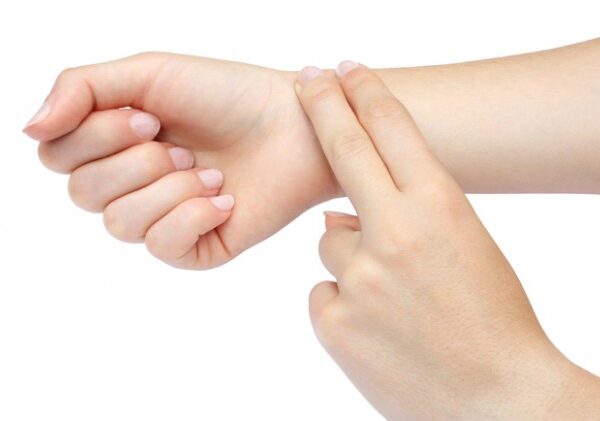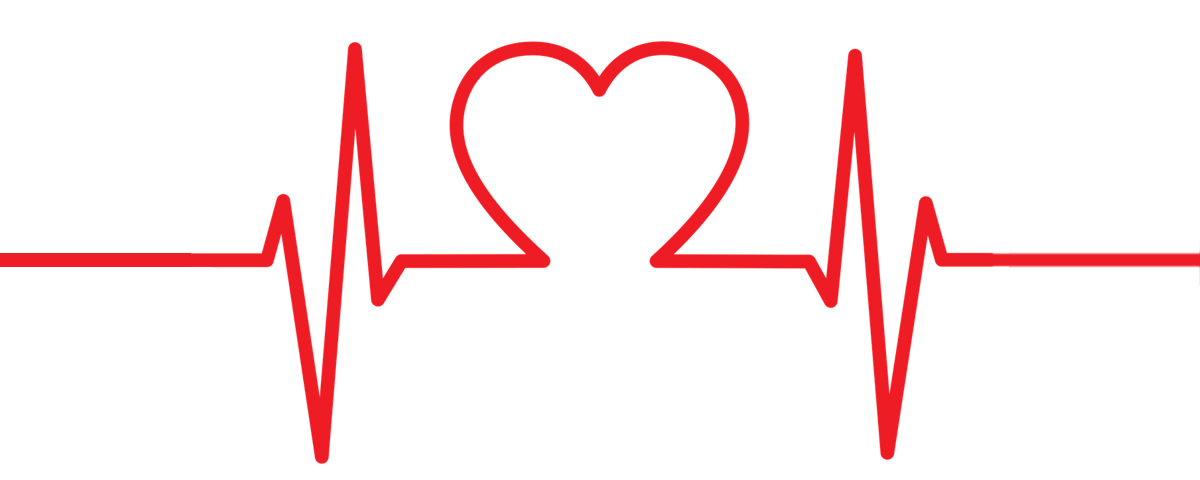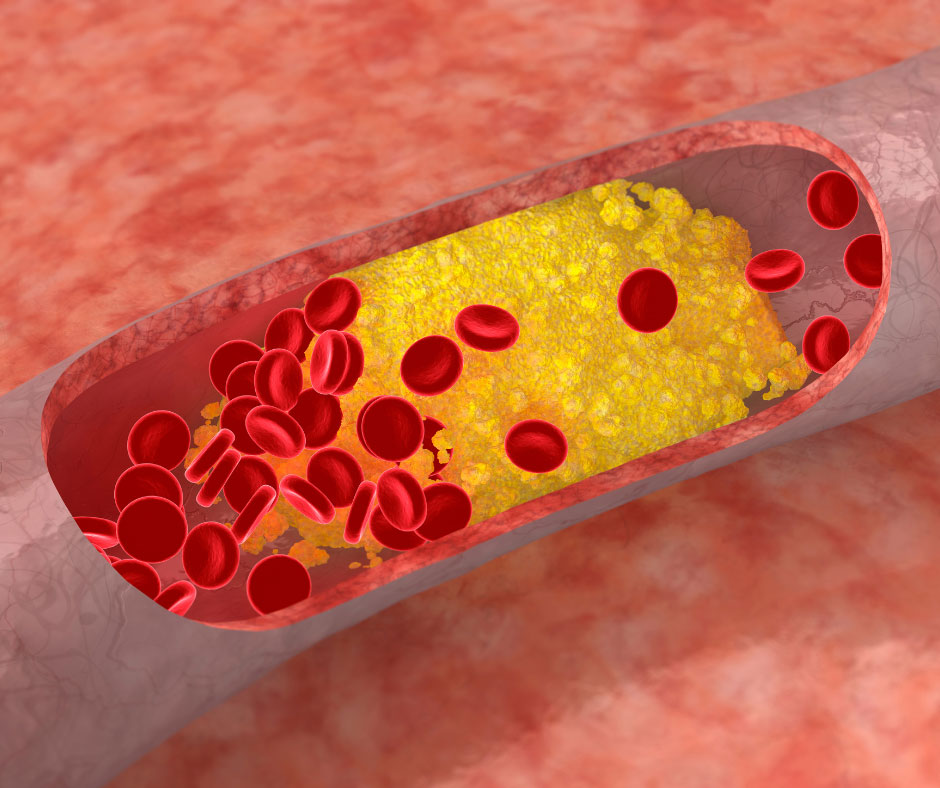Your heart rate is the number of times your heart beats per minute. Throughout the day your heart speeds up and slows down to accommodate your body’s changing need for oxygen. Your heart rate is lower when you are at rest. When you exercise, you heart speeds up and pumps more blood, which allows oxygen-rich blood to flow easily and reach your muscles.
Measuring Your Heart Rate
To measure your heart rate, simply check your pulse. When your heart pumps blood through your body, it creates a pulse that you can feel on the arteries that are close to the skin’s surface. Although you may be able to feel your blood pumping in a number of places—your neck, the inside of your elbow, and even the top of your foot—your wrist is probably the most convenient and reliable place to get a good pulse. To check your pulse at your wrist, place the tips of your index and middle finger on the palm side of your other wrist, below the fat pad of your thumb. Press lightly with your fingers until you feel the blood pulsing beneath your fingers. You may need to move your fingers around until you feel the pulsing. When you feel your pulse, count the number of beats in 15 seconds. Multiply this number by four to calculate the beats per minute to get your heart rate.
Normal Resting Heart Rate
Your resting heart rate is the number of times your heart beats per minute when you’re at rest and your heart is pumping the lowest amount of blood to supply the oxygen your body’s needs. The best time to get your resting heart rate is first thing in the morning, before you get out of bed. A normal resting heart rate is usually 60-100 beats per minute and varies from person to person. A lower resting heart rate is generally means your heart is healthy and in good condition – it can pump more blood with each contraction and doesn’t have to work as hard to maintain a steady beat. An athlete or more active person may have a resting heart rate as low as 40 beats per minute. Children tend to have higher resting heart rates than adults.
Knowing your heart rate can be an important gauge of your heart health. While a higher resting heart rate is generally linked with a sedentary lifestyle, higher blood pressure, and body weight, there is a wide range of normal. An unusually high or low heart rate may indicate an underlying problem regardless of fitness level, and may increase the risk of heart disease and premature death. Consult your doctor if your resting heart rate is consistently above 100 beats a minute (tachycardia) or if your resting heart rate is below 60 beats a minute (bradycardia) — especially if you have other signs or symptoms, such as fainting, feeling dizzy, shortness of breath or chest pain.
Factors That Can Affect Your Heart Rate
A normal heart rate will vary from person to person. There are many factors can affect your heart rate, including:
- Fitness and activity levels: The heart is a muscle and is strengthened by exercise. People who get a lot of physical activity or are very athletic generally have lower heart rates because their heart is in better condition and doesn’t need to work as hard. In people who are sedentary and out of shape, the heart is also out of shape and has to beat more frequently to meet the body’s oxygen demands.
- Smoking: The carbon monoxide in tobacco smoke reduces the amount of oxygen in your blood and the nicotine in cigarettes stimulates your body to produce adrenaline. Both can cause your heart rate to increase. Smoking also raises blood pressure, which increases the risk of heart attack or stroke.
- Emotions: Stress, anxiety, fear, or strong emotions can raise your heart rate. Chronic stress exposes your body to a constant overexposure of elevated levels of stress hormones such as adrenaline and cortisol, which can increase your heart rate and the risk of heart attack.
- Body size: Extra weight puts stress on your body and heart. Excess fat restricts the flow of blood through the veins and arteries, causing the heart to beat at a higher rate. In addition, obesity can cause an abnormal heart rhythm called arrhythmia, which, when severe, can lead to a heart attack or stroke.
- Temperature: Your heart rate will increase or decrease in order to maintain your body’s core temperature of 98.6 degrees Fahrenheit. In hot and humid climates and during exercise your heart rate increases and pumps more blood to cool your skin’s surface and transfer heat away from your core. When the body loses heat in cold weather, your heart rate decreases to preserve your core temperature.
- Dehydration: When the body becomes dehydrated following exercise or a lack of fluids, the blood thickens and waste clogs the bloodstream. Your heart will naturally work harder to flush out waste and maintain normal cardiac output. It is recommended that you drink eight 8-ounce glasses of water daily, and drink water before, during and after exercise to prevent dehydration. Alcohol can also cause your body to become dehydrated and lead to an increase in your heart rate.
- Caffeine, Drugs, and Nutritional and Herbal Supplements: Caffeine, cocaine, and certain decongestants and bronchodilators stimulate the nervous system to increase your heart rate. Certain supplements such as potassium or glucosamine can cause an irregular heart rate. Do not take supplements without speaking to your doctor first, as they can interact with some medications or can worsen medical conditions.
- Medications: Medications such as anti-depressants and beta- and calcium channel blockers that are commonly taken by heart patients may decrease your heart rate, while thyroid medications may increase it. Ask your doctor about the medication you are taking and its effects on your heart rate.
- Cardiovascular disease, high cholesterol or diabetes: Low blood sugar in people with diabetes can cause a dangerously low heart rate. High cholesterol can cause atherosclerosis in which the arteries become blocked and the blood flow to the heart becomes clogged, increasing the risk of heart attack or stroke.
- Age: As you age, the rate and regularity of your pulse can change and may signify a heart condition or other condition that needs to be addressed.
- Body position: Resting, sitting or standing, your pulse is usually the same. Sometimes as you stand for the first 15 to 20 seconds, your pulse may go up a little bit, but after a couple of minutes it should settle down.
Lowering a Rapid Heart Rate
Your heart rate may temporarily spike due to nervousness, stress, dehydration or overexertion. Sitting down, drinking water, and taking slow, deep breaths can generally lower your heart rate. To lower your heart rate in the long term, stick to the healthy lifestyles habits listed below:
- Exercise more. In the long term, exercising is the easiest and most effective way to lower your heart rate. Exercising 30 minutes every day will gradually slow your heart rate. However, beware of pushing yourself too hard too often. If you are short of breath, are in pain or can’t work out as long as you’d planned, slow down and gradually build up the intensity of your exercise.
- Reduce stress. Relaxation methods such as relaxation response, meditation, tai chi, and other stress-busting techniques can lower the resting heart rate over time.
- Avoid tobacco products. Smokers have higher resting heart rates. Quitting brings it back down.
- Lose weight. The larger the body, the more the heart must work to supply it with blood. Losing weight can help slow an elevated heart rate.
Your heart rate and blood pressure are two separate measurements. While your heart rate is the number of times your heart beats per minute, your blood pressure is the force of your blood moving through your blood vessels. It is possible for your heart rate to double safely, while your blood pressure may respond with only a slight increase. Both are indicators of your heart’s health and both should be monitored regularly.
References:
- The American Heart Association:
- The Mayo Clinic:
https://www.mayoclinic.org/healthy-lifestyle/fitness/expert-answers/heart-rate/faq-20057979
- Harvard Health Publishing, Harvard Medical School:
https://www.health.harvard.edu/heart-health/what-your-heart-rate-is-telling-you











